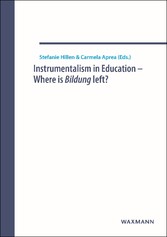Suchen und Finden
Service
Book Cover
1
Contents
5
Preface
7
Instrumentalism in Education – Is there Bildung left? What kind of educational spaces can one find in today’s institutionalised educational situations? An initial rapprochement to the volume’s theme (Stefanie Hillen & Carmela Aprea)
9
Kindergartens – schools without recess – the consequences of an instrumentalist notion of play (Dag Nome)
15
Introduction
15
Kindergartens – a new operator in the educational field
16
Management by objectives in kindergarten
17
The didactic distinction between matter and meaning
18
Play as an instrument for learning
19
The flow of play
21
Kindergartens – schools without recess?
22
Outlook
24
References
25
Bildung – At risk in school organisations? (Jorunn H. Midtsundstad)
29
Introduction
29
Research question and rationale
30
Theory
31
Description of the projects and methodological considerations
33
Findings
35
Discussion
38
Concluding remarks
39
References
39
Freedom of speech in the classroom (Ilmi Willbergh)
43
Introduction
43
Methodology
44
Findings
47
Textual level: vocabulary on subject matter
47
Textual level: questioning
48
Discursive level: speech acts
49
Social level: values and meanings in schools
50
Discussion
52
References
54
Teachers’ discourses about the Norwegian national tests (Turid Skarre Aasebø)
59
1. Introduction
59
2. National test system and the teachers
60
3. Research method
61
4. A professional discourse emphasising teachers’ autonomy
63
5. Improvement of teaching and learning
64
6. External pressure and internal discourses
67
7. Concluding remarks
69
References
70
Why do students ask: how much do I need to read to pass the exam? – A conceptual discussion and an empirical inquiry on trends of instrumentalism in study programmes experienced by today’s students (Stefanie Hillen)
73
Introduction – Higher Education sector has been touched by the accountability trend
73
International trends in education and refl ective teaching and learning
74
Instrumentalism: an overview
75
Quality Reform in Norway and the concept of outcome-based learning
76
Results of the Norwegian Quality Reform: a summary
79
Case study
80
Is Bildung jeopardised by instrumentalised education? Further discussions and outlook
83
Acknowledgements
85
References
85
Exploring the possibilities for a bildungs-oriented conceptualisation of financial literacy education (Carmela Aprea, Eveline Wuttke & Michaela Stock)
89
1. Introduction
89
2. Existing conceptualisations of fi nancial literacy
91
2.1 Financial literacy as personal financial management education
91
2.2 Financial literacy as critical consumer education
93
2.3 Financial literacy as part of economic or socio-economic education
94
3. Further points of reference for sustaining a bildungs-oriented conceptualisation of financial literacy and financial education
96
3.1 Wolfgang Klafki’s concept of Allgemeinbildung: concentration on epochal typical key problems
96
3.2 Impulses from Bildungsgang theory: developmental tasks and constructions of meaning
97
3.3 Instructional approaches to situated learning: guided participation to social practices and authentic learning environments
98
4. Exemplary strategic principles for a bildungs-oriented conceptualisation of financial literacy education
99
5. Conclusions
101
References
102
Instrumental Comparativism in vocational education: Policy borrowing instead of systemic development (Volker Bank)
105
1. Policy borrowing as a type of instrumentalism
105
2. The Danish prototype and its counterpart in Schleswig-Holstein
107
3. A case of policy borrowing – or just a failure?
111
4. A policy of systemic perturbation instead of a policy of instrumental borrowing
114
References
115
Juridical Sources
116
Educational challenges in the shadow of instrumentalism (Aslaug Kristiansen)
117
1. Instrumental rational thinking
117
2. Some characteristics of the current educational situation in Norway
118
3. Bildung – a brief sketch
119
4. Critique of Bildung
122
5. Beyond Bildung?
125
6. Martin Buber’s constitution of the educational relationship
126
7. Discussion: The need to a broad approach to the fi eld of education
127
8. Towards the end – a conclusion
128
References
129
Instrumentalism – Where is Bildung left? A reflective discussion on the contributions (Bernadette Hörmann)
131
Instrumentalism – Where is Bildung left? – A view from the side lines of a debate (Rocco M. Postiglione)
139
The domination of technology and Bildung: instrumentalism triumphant?
139
Instrumentalism: Dewey and Keynes
141
Technique and testing: Instrumentalism in school and the concept of limit
141
The Gilded age and the reasons for testing
143
Equality of opportunity as equality of capabilities: Mastery learning
144
The testing and the ethical basis of Mastery learning
146
The admirable Norwegians and testing: what is the problem?
147
Formative Evaluation
148
A missed but needed thematisation: Ethics and religion (for a new instrumentalism vs. Bildung seminar)
150
Bildung and pa.de.a24 (paidèia): Education and the image of the.....p.. (ànthropos)
152
References
154
About the authors
157
Alle Preise verstehen sich inklusive der gesetzlichen MwSt.










